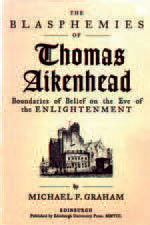 Don’t be ashamed if all you know of Scotland is Haggis, the Loch Ness Monster and Mel Gibson in a kilt.
Don’t be ashamed if all you know of Scotland is Haggis, the Loch Ness Monster and Mel Gibson in a kilt.
Michael F. Graham, professor of history at UA, thankfully can remedy those shortcomings with a compelling story of a poor student executed for saying the wrong thing at the very wrong time. And this month, Dr. Graham’s book comes out in paperback, making it more accessible to additional readers across the globe.
Professor Graham apparently enjoys diving back a few centuries into the muck of mistrust, misogyny, murder and mayhem that made up Edinburgh, Scotland in the late 17th Century. The turmoil and drama of Scotland during that era were prolific; historians have had no difficulty finding facts, factions, and freedom-fighters to analyze.
But Dr. Graham’s book, "The Blasphemies of Thomas Aikenhead: Boundaries of Belief on the Eve of the Enlightenment", isn’t just typical analysis; it tells a compelling story of a nation through the trajectory of one man, a 20-year-old that was executed in 1697 for blasphemy. That intimate story was a reason publisher Edinburgh University Press decided, after the first-run hard-cover books were snapped up, to issue the book in paperback this summer.
“Michael has written this book – a serious history –in a sufficiently accessible style to be viable as a paperback,” said Colitine Murray, spokeswoman for publisher.
Murray said Dr. Graham uses an approach known in historian circles as “micro history,” which is an academic corollary to the short story. Micro history is an increasingly popular genre of social history, said Hepburn of Edinburgh University Press. It dives beneath the superficial but complex social structures to reach the thick details of an individual’s life.
However micro history is not biography. The value of examining the person’s life does not come from the subject’s uniqueness but from its power as an example. The individual’s life serves as an allegory explaining the rules clearly to the whole of society.
Actually, Micro history has more in common with a mystery novel than a biography
And like many a good mystery, Graham begins his book with a dead body… Well, a nearly-dead body. As the book opens, Thomas Aikenhead, a sometime student of Edinburgh University is navigating the city and jeering crowds on the way to his execution site, sort of like the “perp” walk of today. His crime? Blasphemy -- a crime against God that hadn’t merited a death sentence in the Isle of Britain in more than 85 years. And Aikenhead had the dubious distinction of being the last man in history to be executed for blasphemy in Great Britain.
Why this poor guy? It’s a question Dr. Graham answers, by opening the doors and windows to Edinburgh during the confessional Reformation. Aikenhead, as many college students before and since spouted his nascent questions about religion, God, and sin loudly and in public places, along with his fellow students – not uncommon behavior for that age.
But Aikenhead had no way of knowing he was playing into the hands of the Presbyterian Kirk otherwise known as the Church of Scotland. The Scots were perennially trying to distance themselves from England. But there was constant turmoil among of Kirk leaders during the Reformation, and unification would require definitive action and a shared enemy.
Aikenhead was the right man at the right time for the Kirk. He would set an example for those whose ideas outside of the strict Calvinist-based Presbyterianism that dominated the long Reformation. Indeed, Thomas Aikenhead’s execution served as a milestone in Scotland’s passage from the brutal Reformation to the true Enlightenment,
“Graham shows us with vividness and some effective dramatic timing, the worst that can happen when self-righteousness and political expediency join force.” wrote Dilys Rose of the Edinburgh Review.
 The University of London’s Justin Champion wrote in Reviews in History that Dr. Graham’s work “is detailed and archivally informed historical writing - exploiting parish, judicial, ecclesiastical and private papers. Graham delivers a textured sense of the tense atmosphere riven by a bustling and intellectually robust university and the assumptions of a civic society which assumed the rightness of divine punishment for public sins... An excellent contribution to contextualizing both the possibilities and consequences of articulating dissident ideas in an anxious confessional culture.
The University of London’s Justin Champion wrote in Reviews in History that Dr. Graham’s work “is detailed and archivally informed historical writing - exploiting parish, judicial, ecclesiastical and private papers. Graham delivers a textured sense of the tense atmosphere riven by a bustling and intellectually robust university and the assumptions of a civic society which assumed the rightness of divine punishment for public sins... An excellent contribution to contextualizing both the possibilities and consequences of articulating dissident ideas in an anxious confessional culture.
Karen Baston, writing for the "Early Modern Intelligencer", puts it a bit more simply: “ {Graham} explains how a student became a scapegoat.”
Graham’s book will be out in paperback on Aug. 31 on all major book sites for about $30 and on the shelves of some specialty bookstores.
